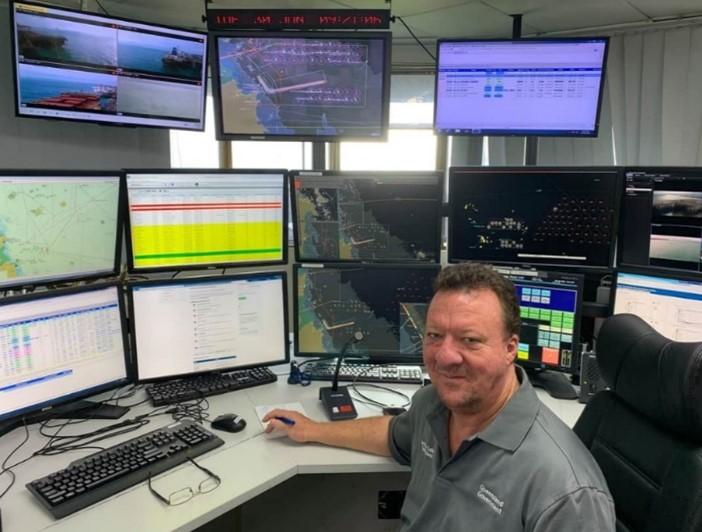VTS award

Warren was nominated for coordinating the response action of allied services—including tugs, port pilots and helicopter operators—when reports came through of a bulk carrier drifting 20 metres off the berth at Hay Point at 1am on 21 April 2019.
Warren’s quick response ensured the vessel was brought back alongside within three-and-a-half hours with no damage to the bulk carrier, other ships berthed at the port, the offshore terminal infrastructure and no pollution event.
In assessing the nominations, the VTS award selection panel—comprising representatives from Australia’s VTS authorities and AMSA—was of the view that all nominations adequately addressed the criteria for nomination and were of a high calibre.
Two other nominations have been highly commended:
- Port Hedland VTS were commended for their swift response to action local rescue assets to rescue four people clinging to the upturned hull of their recreational vessel.
- Todd Stewart and Ricky Blake from Brisbane VTS were commended for their timely assistance to call on ships anchored in the vicinity of a search mission to help widen the search area, resulting in the rescue of three people lost at sea.
About the award
The VTS award was launched in December 2019 to recognise an outstanding contribution by a VTS to the safety of life at sea, safety and efficiency of navigation, and the protection of the marine environment.
Nominations for the 2020-21 VTS award open on 1 October 2020.
Further information is available.
IALA update
VTS Committee
With the new IMO resolution for VTS expected to come into effect in 2021, the committee is actively engaged in a major review and update of the IALA standards related to VTS.
Following cancellation of the committee’s March meeting due to COVID-19 restrictions, four correspondence groups were established to focus on documentation associated with:
- establishing and implementing VTS (CG1)
- VTS qualifications and training (CG2)
- VTS operations and operational procedures (CG3)
- communications and phraseology (CG4).
AMSA has been actively engaged in each of the groups. This work will be considered by the VTS committee at its online meeting 21 September to 15 October 2020.
Workshop on VTS Training and Qualifications
The VTS committee hosted an online workshop VTS Training and Qualifications, 2020 and beyond (15 and 18 June 2020). This was the first online IALA workshop and successfully highlighted the potential for such events. In summary:
- The workshop incorporated the use of five concurrent breakout groups.
- Over 60 participants from competent authorities, VTS authorities and training organisations participated.
VTS Advisory Group
The advisory group hosted an online workshop on 29 July to review the outcomes from the recent IALA workshop VTS Training and Qualifications, 2020 and beyond.
This workshop provided the opportunity for members to consider the outcomes from the IALA workshop and possible implications for IALA’s current review of its Recommendation R0103 (V-103) on Training and Certification of VTS Personnel.
The next meeting of the advisory group is scheduled for 28 and 29 October.
IALA calendar
VTS-related events coming up at IALA include:
- VTS Committee: 21 September to 15 October 2020
- IALA Symposium: 19-23 April 2021, Rotterdam, The Netherlands.
IALA Risk Management Toolbox - proposed training seminar
Originally planned for September this year, the seminar is now scheduled for 8 to 12 February 2021, due to COVID-19 restrictions. The venue remains unchanged—Port Education Centre, Melbourne.
The focus of the seminar is to provide detailed instruction, including case studies and hands-on practical use of IALA’s risk models:
Ports and Waterways Safety Assessment (PAWSA)—This tool provides a structured and systematic approach to:
- identify major waterway safety hazards
- estimate risk levels, evaluate potential mitigation measures, and
- set the stage for implementation of selected measures to reduce risk.
As a qualitative tool, PAWSA is exploratory and the analysis component seeks to get a deeper understanding of why a certain phenomenon occurs, its associated consequences and the potential effectiveness of additional mitigation measures.
A comprehensive explanation of PAWSA can be found in IALA Guideline 1124.
The IALA Waterway Risk Assessment Programme (IWRAP)—This program provides a standardised, quantitative method to evaluate the probability of collisions and groundings in a given waterway. It is a Windows-based software program, which allows different scenarios to be developed so that changes—such as those in traffic volume or composition, route geometry, aids to navigation or the introduction of other mitigating measures—can be modelled.
Comprehensive explanation of IWRAP can be found in IALA Guideline 1123.
Contact details
Neil Trainor
Principal Advisor - Vessel Traffic Services
07 3001 6822
0408 559 849
neil.trainor@amsa.gov.au